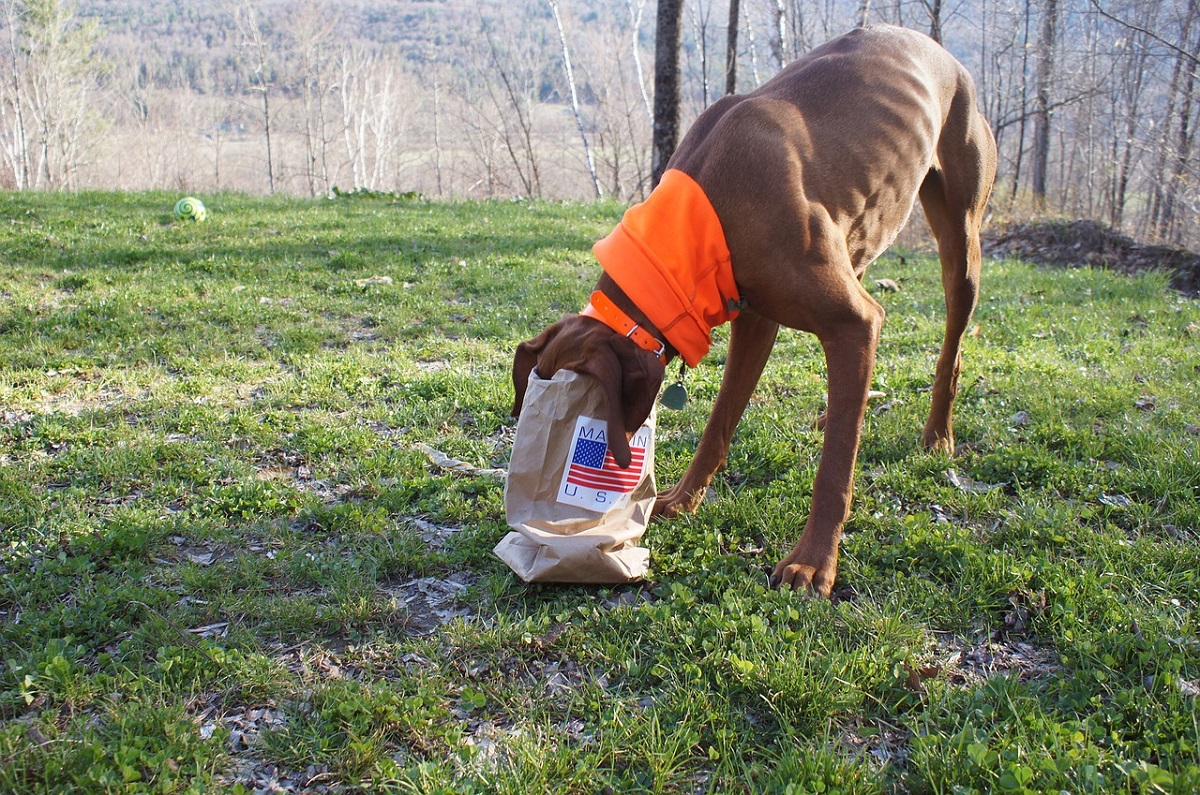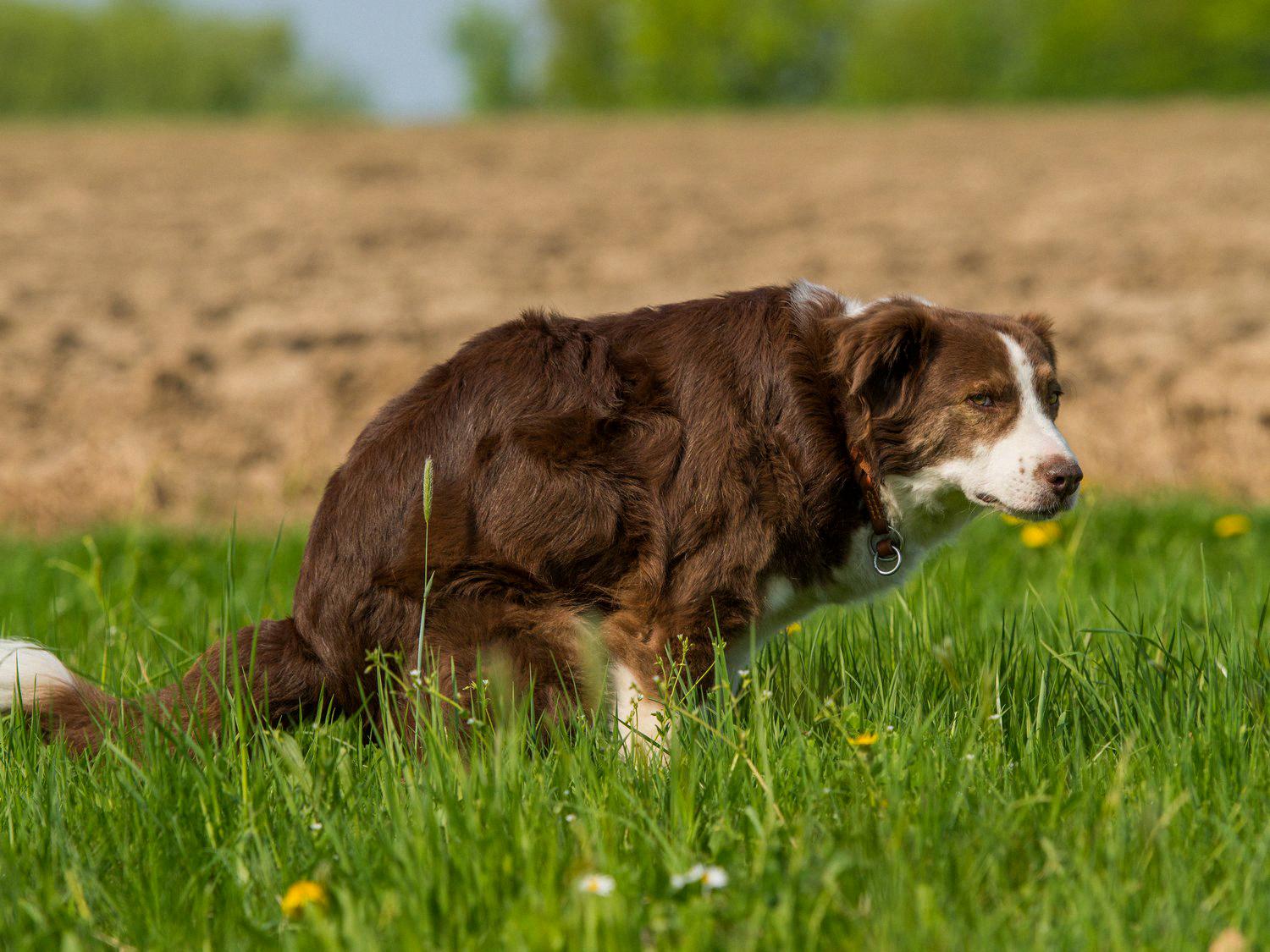

FAQs
What Causes A Dog To Fart
Modified: August 5, 2023
Find out what causes a dog to fart and get answers to all your general questions about canine flatulence.
(Many of the links in this article redirect to a specific reviewed product. Your purchase of these products through affiliate links helps to generate commission for Under-tec.com, at no extra cost. Learn more)
Table of Contents
- Introduction
- Common Causes of Dog Farting
- Dietary Factors That Cause Dog Farting
- The Role of Digestive Issues in Dog Farting
- Understanding Food Allergies and Intolerances
- Behavioral Factors That Contribute to Dog Farting
- Health Conditions That Cause Excessive Dog Flatulence
- How to Reduce and Manage Dog Farting
- Conclusion
Introduction
Flatulence, or farting, is a natural bodily function that occurs in humans and animals alike, including our furry companions, dogs. While the occasional fart from our four-legged friends may not be cause for concern, excessive dog farting can be both embarrassing and unpleasant for both the dog and its owner.
In this article, we will explore the common causes of dog farting and provide insights into how to reduce and manage this gassy issue. From dietary factors to digestive issues and health conditions, there are several factors that can contribute to a dog experiencing excessive flatulence. By understanding the underlying causes, dog owners can take appropriate measures to alleviate the problem and improve the overall well-being of their beloved pets.
It is important to note that dog farting is a normal physiological process. Like humans, dogs produce gas in their gastrointestinal tract as a byproduct of digestion. However, certain factors can contribute to an increase in gas production, leading to more frequent and odorous flatulence.
Whether you’re a new dog owner or have been living with dogs for years, understanding the causes of excessive dog farting can help you address the issue effectively. By making dietary adjustments, addressing digestive problems, and identifying potential health conditions, you can take steps to reduce and manage your dog’s farting problem.
So, if you’ve ever wondered why your furry friend is creating a stink in the room, keep reading to uncover the different factors that can cause a dog to fart and learn how to mitigate this significant source of odor in your home.
Common Causes of Dog Farting
While occasional farting is normal for dogs, excessive flatulence can be indicative of an underlying issue. Let’s take a look at some common causes of dog farting:
- Dietary Factors: One of the primary culprits of dog farting is their diet. Certain foods contain high amounts of fermentable carbohydrates, such as beans, lentils, and soy, which can produce excessive gas during the digestion process. Additionally, feeding your dog table scraps or giving them access to rich and fatty foods can also contribute to increased flatulence.
- Digestive Issues: Dogs with sensitive digestive systems may experience frequent farting. Conditions like gastrointestinal infections, malabsorption disorders, and inflammatory bowel disease can disrupt the normal digestion process, leading to gas buildup and subsequent farting.
- Food Allergies and Intolerances: Just like humans, dogs can develop allergies or intolerances to certain ingredients in their food. Common allergens include grains, dairy products, and proteins like chicken or beef. When a dog consumes an allergen, it can trigger an immune response, leading to gastrointestinal discomfort, bloating, and increased flatulence.
- Behavioral Factors: Dogs that gulp down food quickly or eat too fast may swallow a significant amount of air along with their food. This can result in excessive gas production and farting. Stress and anxiety can also contribute to digestive disturbances and increase gas production in dogs.
- Health Conditions: Certain health conditions can contribute to excessive flatulence in dogs. These include pancreatic enzyme deficiencies, gastrointestinal parasites, intestinal blockages, and more. If your dog’s farting is accompanied by other symptoms like diarrhea, vomiting, or weight loss, it is essential to consult with a veterinarian for a proper diagnosis and treatment.
It’s important to remember that each dog is unique, and the causes of excessive farting may vary. By identifying the underlying cause, you can take appropriate measures to address the issue and provide relief for your furry friend.
Dietary Factors That Cause Dog Farting
The food dogs consume plays a significant role in their overall health and can also contribute to excessive flatulence. Here are some dietary factors that can cause dog farting:
- Fiber-rich Foods: While fiber is essential for a healthy digestive system, consuming too much fiber can lead to increased gas production in dogs. Foods high in fiber, such as beans, lentils, and certain vegetables like broccoli and cauliflower, can cause fermentation in the gut, resulting in more frequent and smelly farts.
- Fatty Foods: Rich and fatty foods can take longer to digest, leading to increased fermentation in the gut. This can result in excess gas production and flatulence. It’s best to avoid feeding dogs excessive amounts of fatty meats or table scraps that are high in fat, as these can contribute to excessive farting.
- Grains and Gluten: Some dogs may be sensitive to grains and gluten, which can lead to digestive discomfort and increased flatulence. Common grains that can cause issues include wheat, corn, and soy. Consider switching to grain-free or gluten-free dog foods if you suspect your dog is intolerant to these ingredients.
- Food Additives and Preservatives: Certain additives and preservatives found in commercial dog foods can trigger digestive issues and increase flatulence in dogs. Ingredients like artificial colors, flavors, and chemical preservatives may not be well-tolerated by some dogs, leading to gastrointestinal disturbances and excessive farting.
- Food Sensitivities and Allergies: Just like humans, dogs can develop sensitivities or allergies to certain food ingredients. Common allergens for dogs include chicken, beef, dairy products, and grains. If your dog experiences frequent farting along with other symptoms like itchiness, digestive upset, or skin issues, it could be a sign of a food allergy or sensitivity. Consult with a veterinarian to determine the best diet for your dog.
- Poor Quality or Inappropriate Diet: Feeding your dog a low-quality or inappropriate diet can result in poor digestion and increased gas production. It’s important to choose a high-quality dog food that is formulated for your dog’s specific age, breed, and size. Consult with a veterinarian to ensure your dog’s diet is nutritionally balanced and suitable for their individual needs.
To help reduce dog farting related to dietary factors, consider making gradual changes to your dog’s diet and monitoring their response. Introduce new foods slowly and observe how your dog’s body reacts. Additionally, avoid feeding your dog table scraps and stick to a well-balanced dog food that is appropriate for their specific dietary requirements.
The Role of Digestive Issues in Dog Farting
Dogs can experience various digestive issues that can contribute to excessive flatulence. These issues can disrupt the normal digestion process and lead to increased gas production. Let’s explore the role of digestive issues in dog farting:
- Gastrointestinal Infections: Infections in the gastrointestinal tract, such as bacterial or viral infections, can cause digestive disturbances and lead to excessive gas production in dogs. Common symptoms include diarrhea, vomiting, and abdominal discomfort.
- Malabsorption Disorders: Certain conditions can affect the dog’s ability to absorb nutrients properly. Conditions like exocrine pancreatic insufficiency (EPI) or small intestinal malabsorption can result in undigested food reaching the large intestine, where it gets fermented by gut bacteria, leading to increased gas production and subsequent farting.
- Inflammatory Bowel Disease (IBD): IBD is characterized by chronic inflammation of the gut, which can lead to digestive issues and increased flatulence in dogs. The inflammation results in an impaired digestive process, leading to poor nutrient absorption and increased gas production.
- Gastrointestinal Blockages: Partial or complete blockages in the gastrointestinal tract can cause gas buildup, leading to excessive flatulence in dogs. Blockages can be caused by the ingestion of foreign objects, intestinal tumors, or the presence of gastrointestinal parasites. Alongside farting, symptoms may include vomiting, loss of appetite, and abdominal pain.
- Changes in Gut Microbiome: The gut microbiome is composed of trillions of microorganisms that play a crucial role in digestion. Disruptions or imbalances in the gut microbiome can lead to fermentation of food in the gut, resulting in increased gas production and farting. Factors such as stress, antibiotic use, or dietary changes can influence the gut microbiome.
If you suspect that your dog is experiencing digestive issues, it is vital to consult with a veterinarian for a proper diagnosis and treatment plan. They may recommend diagnostic tests, such as fecal analysis or bloodwork, to identify the underlying cause of the digestive problem.
Depending on the specific condition, the veterinarian may prescribe medication to address inflammation, modify the diet to promote better digestion, or recommend probiotics to support a healthy gut microbiome. By addressing the underlying digestive issue, you can help alleviate your dog’s farting problems and improve their overall digestive health.
Understanding Food Allergies and Intolerances
Food allergies and intolerances can significantly contribute to excessive flatulence in dogs. While they may seem similar, food allergies and intolerances are different conditions that can cause similar symptoms. Let’s explore the differences and how they can affect a dog’s farting:
Food Allergies:
Food allergies occur when a dog’s immune system reacts abnormally to specific proteins found in food. Common allergens for dogs include chicken, beef, dairy products, soy, and grains. When a dog with a food allergy ingests an allergen, their immune system triggers a response, leading to inflammation and various symptoms, including gastrointestinal issues and increased gas production.
Some common symptoms of food allergies in dogs include excessive farting, itching, skin rashes, ear infections, vomiting, and diarrhea. It’s important to note that food allergies are relatively rare in dogs, accounting for only a small percentage of allergic reactions.
Food Intolerances:
Food intolerances, on the other hand, do not involve the immune system. They occur when a dog’s digestive system has difficulty processing certain food components, such as lactose, gluten, or specific food additives. Food intolerances are more common than allergies and can lead to digestive upset, including flatulence.
Symptoms of food intolerances in dogs may include excessive gas, diarrhea, bloating, and stomach discomfort. Unlike allergies, food intolerances often present with gastrointestinal symptoms rather than skin-related issues.
If you suspect that your dog has a food allergy or intolerance, it’s essential to work with a veterinarian to determine the precise cause. The veterinarian may recommend an elimination diet or perform specific diagnostic tests, such as blood allergy testing or dietary trials, to identify the problematic ingredient. Once identified, the treatment involves avoiding the allergenic or intolerable food component in your dog’s diet.
Switching to a hypoallergenic or limited-ingredient diet formulated for dogs with food sensitivities can help alleviate symptoms and reduce flatulence. It’s important to remember that consistency is key, and it may take time and patience to find the right diet that suits your dog’s needs.
By understanding and addressing food allergies and intolerances, you can improve your dog’s overall digestive health, reduce excessive farting, and enhance their overall well-being.
Behavioral Factors That Contribute to Dog Farting
Believe it or not, certain behaviors exhibited by dogs can contribute to their farting habits. Let’s explore some behavioral factors that may contribute to increased flatulence in dogs:
- Eating Too Quickly: Some dogs have a tendency to gulp down their food quickly. This rapid eating can cause dogs to ingest a significant amount of air along with their food. The swallowed air can lead to increased gas production and subsequent farting. To prevent this, consider using slow feeder bowls or puzzle toys to slow down your dog’s eating pace.
- Chewing Habits: Dogs that excessively chew on toys or other objects may end up swallowing air along with their incessant gnawing. This excessive air intake can contribute to increased gas production and farting. It’s important to provide appropriate chew toys and monitor your dog to prevent excessive ingestion of air.
- Stress and Anxiety: Dogs that experience stress or anxiety may exhibit changes in their digestive patterns. Stress can affect the normal functioning of the gastrointestinal system, leading to increased gas production and flatulence. If your dog’s farting coincides with stressful situations, consider implementing stress-reducing techniques, such as providing a calm environment or incorporating anxiety-reducing activities like regular exercise or mental stimulation.
- Changes in Routine: Dogs thrive on routine, and sudden changes in their daily routine or environment can cause stress and disrupt their digestion. Dogs may experience increased gas production and farting during periods of change or when exposed to new environments. Gradual transitions and maintaining a consistent routine can help minimize gastrointestinal disturbances and reduce flatulence.
- Ingesting Inedible Items: Dogs are notorious for their curiosity and tendency to get into things they shouldn’t. Ingesting non-food items, such as grass, leaves, or even garbage, can lead to gastrointestinal disturbances and subsequent gas production. This can result in excessive farting. It’s essential to keep a watchful eye on your dog and prevent access to non-edible items.
Understanding these behavioral factors can help you identify potential causes of increased flatulence in your dog. By addressing these behaviors and ensuring a stress-free environment, you can help reduce excessive farting and promote better digestive health in your canine companion.
Health Conditions That Cause Excessive Dog Flatulence
Excessive flatulence in dogs can sometimes be attributed to underlying health conditions. These conditions can disrupt the normal digestive process and lead to increased gas production. Here are some health conditions that can cause excessive dog flatulence:
- Pancreatic Enzyme Deficiencies: The pancreas plays an essential role in producing digestive enzymes that help break down food. Dogs with pancreatic enzyme deficiencies, such as exocrine pancreatic insufficiency (EPI), are unable to produce enough digestive enzymes, leading to poor digestion, malabsorption, and increased gas production.
- Gastrointestinal Parasites: Parasites, such as intestinal worms, can disrupt the normal functioning of the gastrointestinal tract, leading to digestive disturbances and increased flatulence. Symptoms may include excessive farting, diarrhea, weight loss, and a dull coat. Regular deworming and maintaining good hygiene practices can help prevent and manage parasite-related flatulence.
- Intestinal Blockages: Partial or complete blockages in the gastrointestinal tract can cause gas buildup, leading to excessive flatulence. Blockages can be caused by the ingestion of foreign objects or the presence of tumors in the intestinal tract. Alongside farting, symptoms may include vomiting, loss of appetite, and abdominal pain.
- Inflammatory Bowel Disease (IBD): IBD is characterized by chronic inflammation of the gastrointestinal tract. The inflammation disrupts the normal digestive process, leading to poor nutrient absorption and increased gas production. Dogs with IBD may experience excessive flatulence, diarrhea, vomiting, and weight loss.
- Dietary Indiscretion: Dogs are known for their indiscriminate eating habits and may consume foods or substances that can upset their digestive system. This can result in gastrointestinal disturbances, including gas production and flatulence. It’s important to keep potentially harmful substances out of your dog’s reach and monitor their diet to prevent dietary indiscretion.
- Other Digestive Disorders: Various other digestive disorders, such as colitis, gastritis, or small intestine bacterial overgrowth (SIBO), can contribute to excessive flatulence in dogs. These conditions can lead to inflammation, bacterial imbalances, and impaired digestion, resulting in increased gas production and farting.
If you notice that your dog’s farting is accompanied by other symptoms such as changes in appetite, weight loss, diarrhea, or vomiting, it is crucial to consult with your veterinarian. They will conduct a thorough examination and may recommend diagnostic tests, such as blood work, fecal analysis, or imaging, to identify the underlying health condition.
Treatment for health-related flatulence will depend on the specific condition. Your veterinarian may prescribe medication to address inflammation, recommend dietary changes to improve digestion, or prescribe antibiotics to treat bacterial imbalances. By addressing the underlying health condition, you can help alleviate your dog’s flatulence issues and promote their overall well-being.
How to Reduce and Manage Dog Farting
Dealing with excessive dog farting can be a challenge, but there are steps you can take to reduce and manage this unpleasant issue. Here are some strategies to help alleviate dog farting:
- Dietary Adjustments: Start by reviewing your dog’s diet. Consider switching to a high-quality, easily digestible dog food that is appropriate for your dog’s age, breed, and specific dietary needs. Avoid foods known to cause gas, such as those high in fiber or containing allergenic ingredients. Gradually introduce any dietary changes to prevent digestive upsets.
- Slow Feeding: Dogs that eat too quickly can ingest excessive air, leading to increased flatulence. Slow feeder bowls, puzzle feeders, or interactive toys are great options to encourage your dog to eat at a slower pace, reducing the intake of air along with their food.
- Probiotics: Adding probiotics to your dog’s diet can help promote a healthy balance of gut bacteria. Probiotics can aid in digestion, reduce gastrointestinal inflammation, and minimize gas production. Consult with your veterinarian to find a suitable probiotic supplement for your dog.
- Exercise and Physical Activity: Regular exercise can help stimulate healthy digestion in dogs. Taking your dog for daily walks and engaging them in physical activities can help prevent gastrointestinal disturbances and aid in the prevention of excessive flatulence.
- Avoid Table Scraps and Inedible Items: Table scraps are often high in fat and can cause digestive upset and increased flatulence. Additionally, make sure to keep harmful non-food items out of your dog’s reach, as ingesting them can lead to gastrointestinal issues and excessive gas production.
- Stress Management: Stress and anxiety can contribute to digestive disturbances in dogs, including increased gas production. Creating a calm and stress-free environment for your dog, providing mental stimulation, and implementing regular routines can help reduce stress-related flatulence.
- Veterinary Consultation: If your dog’s flatulence persists or is accompanied by other concerning symptoms, it is crucial to seek guidance from your veterinarian. They can perform a thorough examination, conduct diagnostic tests, and provide appropriate treatment for any underlying health conditions contributing to excessive farting.
Remember, each dog is unique, and what works for one may not work for another. It may take some trial and error to find the right approach to reduce and manage your dog’s farting. Monitoring your dog’s diet, behavior, and overall health can help you identify triggers and make adjustments accordingly.
By implementing these strategies, you can help minimize your dog’s flatulence, improve their digestive health, and create a more pleasant and odor-free environment for both you and your furry friend.
Conclusion
Excessive flatulence in dogs can be a common and sometimes embarrassing issue. However, understanding the causes and implementing the right strategies can help reduce and manage dog farting effectively.
Throughout this article, we have explored various factors that can contribute to excessive flatulence in dogs. Dietary factors, such as certain foods and additives, can increase gas production. Digestive issues, like gastrointestinal infections or malabsorption disorders, can disrupt the normal digestion process. Food allergies and intolerances can also lead to excessive flatulence. Behavioral factors, stress, and anxiety can impact a dog’s digestive system and contribute to farting. Additionally, certain health conditions, ranging from pancreatic enzyme deficiencies to gastrointestinal blockages, can cause excessive flatulence in dogs.
To reduce and manage dog farting, it is crucial to make dietary adjustments by choosing a high-quality, appropriate dog food, and implementing slow feeding techniques. Probiotics can also aid in digestion and minimize gas production. Regular exercise, stress management, and avoiding table scraps and inedible items can further help alleviate excessive flatulence.
If your dog’s farting persists or is accompanied by other concerning symptoms, seeking veterinary consultation is essential. A veterinarian can conduct diagnostic tests and provide appropriate treatment for any underlying health conditions causing excessive flatulence.
Remember, each dog is unique, and it may take some time to find the right approach to reduce and manage your dog’s farting. By being attentive to their diet, behavior, and overall health, you can identify triggers and make the necessary adjustments.
By implementing these strategies and understanding the causes of excessive flatulence in dogs, you can create a more comfortable living environment for both you and your furry companion. Keep in mind that a little bit of farting is normal for dogs, but excessive and odorous flatulence is worth addressing for the well-being and comfort of your dog.










